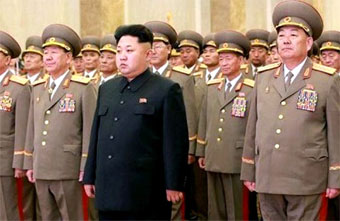
Top N. Korean Defense Minister Executed
| published May 13, 2015 |
By Thursday Review staff
According to a variety of intelligence and news sources in Asia, North Korean Defense Minister Hyon Yong Chol has been executed by North Korean leader Kim Jong-un.
The top military commander’s crime: snoozing during a lengthy military meeting, and later being insubordinate to Kim Jong-un. South Korean intelligence agencies say that General Hyon Yong Chol was executed in public, shot in front of hundreds of invited guests and spectators at an army practice range near Pyonyang, killed by anti-aircraft gunfire from a distance of about fifty yards.
Rumors of Hyon’s gruesome execution had been circulating via political sources for about a week. No major news agency has been able to confirm the reports of Hyon’s execution, but according to political sources in Seoul, word of the grisly execution has reached South Korea through multiple channels. Accurate news from inside North Korea is often hard to come by, and confirmation of the execution may not come until photographic or video proof emerges. North Korea has severe limitations on digital and internet access, and strictly controls what internal news it wishes to release to the rest of the world.
Neither the U.S. State Department nor the White House has commented officially on the rumors of the execution, which South Korean intelligence sources say are reliable.
The Kim family has maintained a long dynastic rule of North Korea since 1948. The word of North Korean leaders is taken without questioning, and those who deign to contradict or offend the country’s top family leader can expect to face harsh punishment, even sometimes death. Kim Jong-un is the grandson of North Korea’s first dictator, Kim Il-Sung.
Experts on North Korean politics say that the young Kim Jong-un, who became the nation’s supreme leader after the death of his father Kim Jong-il, may be using the terror of violent purges and executions to enforce loyalty and keep political opposition squelched. Kim has already executed numerous top members of government, including an uncle—Jang Song Theak—the country’s number two leader whom the newly minted dictator deemed disloyal. General Hyon’s execution may be the latest in a string of top executions meant to keep others in line. By U.S. and South Korean estimates, some 70 high-level executions have taken place in the four years since Kim took the reins of power after the death of his father.
Execution by firing squad may seem violent enough, but execution by use of an anti-aircraft gun would be particularly gruesome. Experts on North Korean affairs suggest that it the reports prove to be true, it may indicate just how far Kim intends to go to instill fear in potential adversaries and political opponents.
Those who closely watch the limited news coming from North Korea are divided as to whether Hyon’s execution is a sign of fractures within the top echelons in Pyongyang—meaning that things could become more unstable if additional purges continue—or merely the young Kim attempting to assert his absolute power over rivals or dissenters among the leadership.
Related Thursday Review articles:
North Korea Issues Threat Against U.S. Ambassador; Thursday Review; April 17, 2015.
North Korea: The Emperor’s New Clothes; Kevin Robbie; Thursday Review; March 20, 2015.
